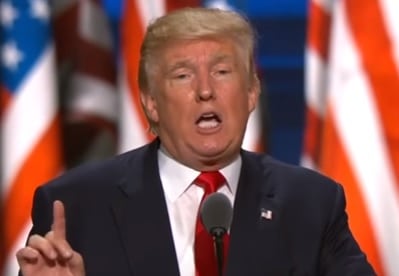
The overregulation the fossil energy industries have endured through the Obama administration will look like child’s play compared to what would happen during a Hillary Clinton presidency, Republican presidential candidate Donald Trump said Thursday during a keynote speech at the Shale Insight conference in Pittsburgh. “She’s not only declared war on the miners but on all oil and natural gas production. It’s war,” Trump said. “It’s going to be worse under her than it’s been under President Obama.”
Clinton’s energy plan will result in the “the aggressive restriction of American energy production,” Trump said, noting the Democratic presidential nominee’s stated intent to end fossil fuel leasing on federal lands and to ramp up the climate change policies of the current administration. “As far as regulations are concerned, it will be beyond anything you’re experiencing right now, so you better get everybody out to vote folks, or you can sort of forget it,” Trump said, stating that overregulation restricts the growth of the energy industry.
The Obama administration’s Clean Power Plan, carbon emissions standards for existing coal-fired power plants, which Trump described as “very unfair to our people and our workers,” would be on the chopping block, as would the Climate Action Plan.
Trump also noted the inclusion of a call for carbon pricing in the Democratic National Platform. “That’s just political speak for a massive new tax on coal and shale production, a tax on American consumers, and it’s very unfair for our country, and it makes it very unfair and very uncompetitive to do business with other countries, very, it makes it so tough to compete with other countries,” he said.
The European Union has a carbon pricing system in place, and China, Canada, and Mexico are working to institute such mechanisms in the next couple years. A number of U.S. states are also conducting carbon pricing under the Regional Greenhouse Gas Initiative in nine Northeast and Mid-Atlantic states and California’s AB 32 cap-and-trade system.
A Trump presidency would look very different for the energy industry, he said. “Our energy policy will make full use of our domestic energy sources,” he said. “That means we will end the war on coal, and the war on our miners. I will rescind the coal mining lease moratorium, which is a horrible moratorium and so unfair … and conduct a top-down review of all anti-coal regulation issued by the Obama administration.”
The Interior Department announced in mid-January it would issue no new coal leases on federal lands while completing a Programmatic Environmental Impact Statement (PEIS) of the U.S. coal leasing program. The review is intended to determine if the program is properly structured to provide a fair return to taxpayers, reflects its impacts on the environment, and will continue to help meet the nation’s energy needs. The agency last conducted a PEIS review for the federal coal program in 1983-1984. Currently, approximately 41 percent of the nation’s annual coal production comes from federal land.
Trump would replace the coal leasing moratorium with a moratorium of his own, one on new regulations. “My plan includes the elimination of all unnecessary regulations and a temporary moratorium on new regulations not compelled by Congress or public safety,” he said, adding “we need regulations for safety and environment, but regulations are becoming a major industry right now, and we’re going to make it a much smaller industry, maybe a minor industry.”
Trump’s energy plans have not impressed the scientific community, as illustrated by an open letter signed by 375 members of the National Academy of Sciences, including 30 Nobel laureates, published online Wednesday. Trump has said in the past the climate change is a hoax perpetrated by the Chinese and that as president he would “cancel” the international Paris Agreement on climate change.
“The United States can and must be a major player in developing innovative solutions to the problem of reducing emissions of greenhouse gases. Nations that find innovative ways of decarbonizing energy systems and sequestering CO2 will be the economic leaders of the 21st century. Walking away from Paris makes it less likely that the U.S. will have a global leadership role, politically, economically, or morally. We cannot afford to cross that tipping point,” the letter says.
Even if elected president, it is unlikely that Trump could pull the U.S. out of the Paris Agreement. The agreement is almost certain to enter into force before the next president takes office. Once the agreement enters into force, there is a four-year lag period before any party to the accord may withdraw.